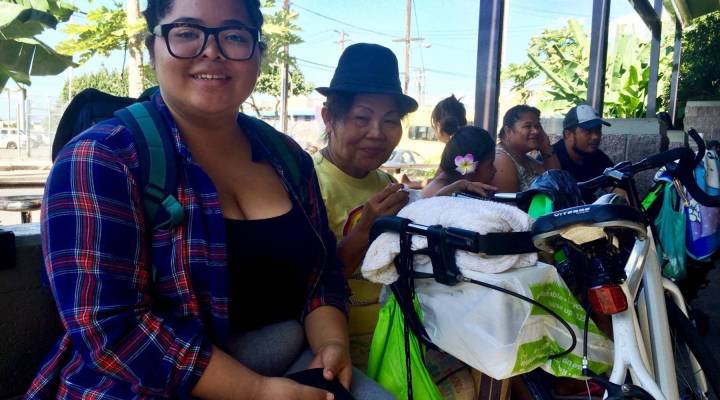
In Hawaii, the reality of homelessness can hit suddenly

It’s a chaotic scene at Honolulu’s largest homeless shelter, the Institute for Human Services Iwilei facility. Babies are crying and children run in the street, as families line up on the porch outside waiting for lunch.
“It’s crowded and there are a lot of people here. That makes it kind of depressing,” said 19-year-old Malia Derden. She’s from Kalihi and used to be homeless, although she prefers the term “houseless.” She’s visiting her mom, Rose, who has been at the IHS shelter for a little more than a year.
“I don’t think she thought that she’d be sixty-something years old and houseless,” said Malia. “It’s not something you plan for.”
Not something you plan for: a lesson Malia learned two years ago. When she was 17, Rose suffered a stroke.
“She has slurred speech, she can’t walk without a walker, and I feel like it’s done some things mentally too,” Malia said as she told me how that stroke changed their lives. “I don’t think I realized that just one medical disaster could really throw you off.”
Unable to work, Rose had to quit her job as a cashier at a Japanese grocery store. Most months, the two of them struggled to meet the rent.
“My mother was the only one working. We didn’t have any family, it was just me and my mom,” Malia explained. “She was the point person who was taking care of both of us. And so when she had a stroke, that security was gone.”
Eventually they were evicted. Malia remembers that day, being alone at the apartment while frantically packing all their things. “My mother wasn’t home, she was at church. But they told me we needed to pack everything and be out that day,” she said. “And I remember trying to talk to them, but it was as if I wasn’t even there.”
With nowhere to go, they ended up at Lighthouse, a 24-hour emergency shelter in Waipahu. Malia, who always had a house, a place to sleep, suddenly found herself lying on a mat on the floor.
19-year old Malia Derden visits her mother Rose at a Honolulu homeless shelter. They fell into homelessness after Rose suffered a stroke.
“And it happened so fast,” Malia recalled. “I did not know any houseless people growing up. I knew people that lived in rooms, people that lived in their grandmother’s house. But they always had a place to go. I didn’t know anybody who lived in a shelter.”
During this time, Malia started to cut herself off. She had been a familiar face at poetry slams. But she stopped going, she was too embarrassed. She wanted to stay hidden.
“I only reached out to people who I considered a resource,” she told me. “I talked to the people who needed to know because I knew that they could help me and my mom. I didn’t want anybody to know.”
The entire time at Lighthouse, Malia was working — sometimes two jobs. Eventually she moved in with a friend.
“That was the first time I started living on my own. At 19 years old, living in a room, paying $650 a month — I was living the adult life,” she said with a laugh. “I didn’t think that was gonna happen.”
Malia’s adult life is not all joy — her mother still lives in a homeless shelter. But Malia’s past isn’t crippling her future.
“I think it’s something that I’m ready to talk about finally,” she said. “I’m at a point where I can say, yeah this did happen. But this is not reality. My reality is something much better.”
That reality could now include getting a degree. Since I met her, she’s been working with a local nonprofit through AmeriCorps. With the help of a scholarship from the program, she may even get to go to college next year.
And she’s returned to poetry slams. She just competed in a national poetry competition in Brooklyn, the first person from Hawai‘i to be sent there.
There’s a lot happening in the world. Through it all, Marketplace is here for you.
You rely on Marketplace to break down the world’s events and tell you how it affects you in a fact-based, approachable way. We rely on your financial support to keep making that possible.
Your donation today powers the independent journalism that you rely on. For just $5/month, you can help sustain Marketplace so we can keep reporting on the things that matter to you.


















